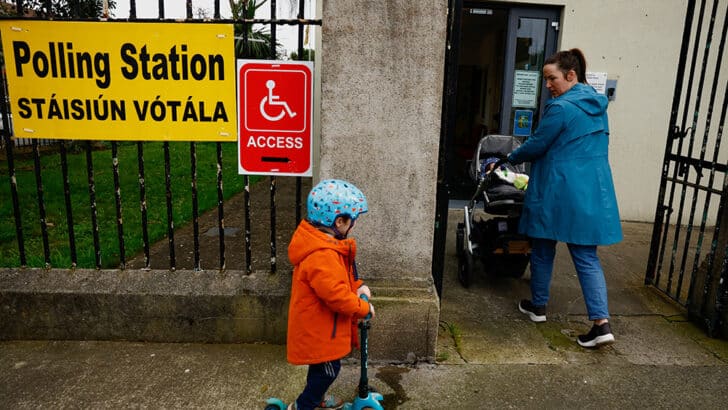The programme for government 2025 was finally revealed last week. After long negotiations a pact was agreed between Fianna Fáil, Fine Gael, and nine Independent TDs.
Having examined the programme, I admit to being flabbergasted at its total disregard of the results of last year’s referendum and the ramifications this has for children and their parents in particular.
To recall, the voting public overwhelmingly rejected the government’s proposal to change the definition of family and erase the words “woman”, “mother” and “home” from the Constitution.
A national referendum is the ultimate exercise in democracy when the people are asked to vote on a change to the law; one would think the government would sit up and listen. In this case, the voters made their position very clear when they rejected the attempt to remove from the Constitution the acknowledgment of the debt the State owes to women for the work they do in the home, yet the programme for government makes absolutely no mention of women who wish to stay at home with their children.
Instead, under the heading “Investing in our Future” the programme states that “affordable, accessible, and high-quality childcare is not just about giving children the best opportunities, it is also about enabling families to make decisions that work for them.”
Support
The government push for childcare as being the “best opportunity” for children or even “enabling” families stands in stark contrast with the evidence about the wishes of most parents. According to the 2022 census, 78% of children are cared for by a parent or a family member with another 2% cared for by a childminder in the home; less than 20% were in childcare outside the home.
And so, ignoring the wishes of the vast majority of parents, the new government is so committed to childcare – despite our oft-reported history of abuse in industrial schools and other state-run or supported institutions, not to mention the current horrific performance of TUSLA with regard to vulnerable children in care – that it promises to “grow State involvement and investment in the sector”.
Studies and statistics attest to the fact that children from single parent households are at much greater risk of poverty”
Their solution? State-owned childcare facilities. To be clear, the government programme supports the separation of children from their parents for much of the week and their placement in state-run institutions: there is no support for parents wishing to care for their children themselves or to have a grandparent or other family member do so.
And if parents want their little one to be cared for in their own home by a childminder, even they will now come within the remit of the National Childcare Scheme. We are assured, however that the regulations will be “sensible”.
The socialist undertones of the programme are further emphasised in the section entitled “Reducing Childhood Poverty”. Again, despite the people’s rejection of the government’s proposal to change the definition of family to essentially water down marriage even more than it has been already, there is no mention of strengthening or supporting marriage.
This despite the fact that marriage is one of the biggest protections against childhood poverty: both studies and statistics attest to the fact that children from single parent households are at much greater risk of poverty. According to one study by the Heritage Foundation, being raised in a married family reduced a child’s probability of living in poverty by about 80 percent.
Nutrition
The Marxist vision is developed further in the promise to extend a “hot meals” programme in schools nationwide. Lest you think that this is for disadvantaged children who might otherwise go hungry, I can confirm that this is to be rolled out in all primary schools in 2025, with a commitment to extend it to all secondary schools in the lifetime of the government.
Regardless of the socio-economic circumstances of the children and their families, the State is now going to feed the children of the nation a hot meal five days a week. There is even to be a Summer 2025 Holiday Meals pilot project, so that state meals continue all year round. “Why is this so bad?” you might ask.
I could talk about the cost of the programme (€300 million), the problems with providing nutritious meals at scale (there are already reports about cheap ultra-processed food being provided at €3.20 per meal), or the incredible waste that will inevitably ensue when picky eaters turn up their noses at what is on offer, but really my main concern is the cost to the family.
There is something unnerving about the State stepping into the shoes of parents who are otherwise providing adequately for their children. Parents have a duty to care for their children and one of their duties is to feed them – they have a right to perform that duty and not have it taken from them by the State.
For those parents who are struggling to feed their children, the government would spend taxpayers’ money more judiciously, and serve families better, by providing cookery workshops to educate parents in how to provide nutritious meals for their children at home.
The raising of children happens in the day-to-day little things, and family mealtimes are critical in this regard. Catholics in particular understand the significance of breaking bread together and its importance in experiencing a sense of community.
So much is learned by children in the preparation of meals and in the sitting down together and partaking of a meal and engaging in conversations around the dinner table: it is truly an essential part of their education.
This is where they develop their sense of personal identity and value”
It is in the preparation of a meal that children learn about nutrition, self-sufficiency and service of others. Seated at the table, they learn social skills, table manners, and etiquette that will empower them in social settings later in life.
In the conversations around the dinner table, children are intellectually stimulated: they learn about the world around them, about their family history, their parents’ lives, and their own history – this is where they develop their sense of personal identity and value.
My personal view is that, next to family prayer, it is probably the most important and formative family activity in the life of a child.
By supporting a childcare model over parental choice, many will feel forced into the workplace. By feeding children in school, the State is setting up a dynamic at home where busy parents won’t bother to cook a hot meal because the children have already eaten.
Connection
Many parents no doubt will be attracted by getting something for “free” – this is always what the socialistic vision offers. However before accepting this, parents would do well to consider the cost to their family relationships.
Missed family meals mean less time spent together as a family around the kitchen table. Less time around the kitchen table means fewer chances to connect between parents and children. Less time spent in each other’s company results in children who feel disconnected, less confident, more alone and less likely to confide and trust in their parents and other family members.
In the midst of a mental health crisis among the Ireland’s youth, the last thing children and teenagers need is more State or institutional involvement: the State makes for a cold mother.
This is the vision of the home to which the Constitution pays tribute and which the Irish people voted to retain”
Children, whether infants or teenagers, need someone who knows them and loves them to care for them, someone who takes the time to know what food is good for them, what they like to eat, and who provides a homely atmosphere in which they can truly be themselves and flourish.
This is the vision of the home to which the Constitution pays tribute and which the Irish people voted to retain. The government in its plans would do well to remember this. And we would do well to remember that there is no such thing as a free lunch.


 Maria Steen
Maria Steen